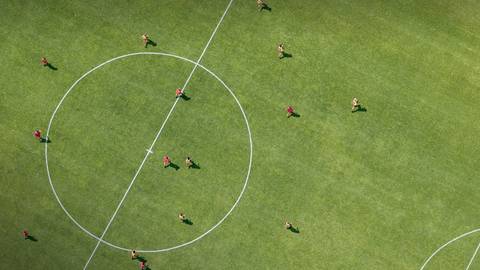U16 football represents a crucial developmental stage for young players across the United Kingdom, typically involving youth aged 15-16 years old. This category serves as a bridge between junior football and more advanced competitive levels, allowing talented youngsters to refine their technical abilities and tactical understanding. Youth leagues at U16 level provide structured competition that helps develop players who may progress to academy systems or semi-professional clubs in the future.
The U16 age group is particularly significant in player development pathways, with many professional clubs closely monitoring performance at this level. Regional and national tournaments offer platforms for these young players to showcase their skills against diverse opposition. While some international competitions exist, such as the OFC U-16 Men's Championship, domestic league structures remain vital for consistent player development.
For grassroots coaches working with U16 teams, this age group presents unique challenges and opportunities. Players at this stage are developing physically at different rates, requiring coaches to adapt training methods accordingly. The technical foundation established during these formative years often determines whether players can transition successfully to adult football, sometimes called soccer in international contexts, making quality coaching at U16 level essential for the future of the sport.
Understanding U16 Football
U16 football represents a crucial developmental stage for young players as they transition toward more advanced tactical understanding and physical maturity. This age group balances skill development with competitive elements while preparing players for the next steps in their football journey.
The Significance of Youth Football
Youth football provides essential foundations for long-term player development. For U16s specifically, this age marks an important transition where players begin to understand more complex tactical concepts and develop greater physical capabilities. Regular participation helps teenagers build discipline, teamwork, and communication skills that extend beyond the pitch.
The coaching approach at this level focuses on refining technical abilities while introducing more sophisticated game strategies. U16 players typically show increased capacity for understanding positional responsibilities, particularly in defensive shape and compact formations.
Youth football at this stage also serves as a gateway for identifying talented players who might progress to academy systems or higher competitive levels.
Age Categories in U16
The U16 age bracket typically includes players who are under 16 years old at the start of the season. In UK grassroots football, this means players who haven't reached their 16th birthday by 31st August of the current season year.
U16 teams often represent the final stage before players move into youth/adult transitional programmes. Physical development varies significantly at this age:
- Some players have nearly reached adult height and build
- Others may still be in earlier stages of puberty
- Strength and speed differences can be substantial
Coaches must account for these developmental variations when planning training sessions. U16 football features standard 11-a-side matches with regulations closer to the adult game, though with adjusted match duration (typically 80 minutes rather than 90).
Most leagues organise U16 competitions by geography before potential progression to regional or national tournaments for higher-performing teams.
Key Components of Coaching U16 Football
Coaching U16 football requires balancing technical development with tactical understanding while managing adolescents' physical and psychological growth. Effective coaching at this level builds foundations for advanced play while nurturing passion for the sport.
Developing Physical Abilities
At U16 level, players experience significant physical changes that coaches must address strategically. Training sessions should incorporate fitness elements tailored to adolescent development without risking injury or burnout.
Strength and conditioning work becomes increasingly important, with focus on core stability, balance and coordination. These elements support technical execution under match pressure and help prevent injuries common during growth spurts.
Speed and agility drills should feature prominently, with particular attention to proper technique. Short, intense bursts of activity followed by adequate recovery periods work best at this age.
Coaches must monitor training loads carefully, recognising that players develop at different rates. Individualised approaches may be necessary for those experiencing growth spurts or developmental differences.
Tactical Training Strategies
U16 players are ready for more sophisticated tactical concepts beyond basic positioning. Introduce formations like 4-4-2 or 4-3-3, explaining each position's specific responsibilities within the team structure.
Defensive shape becomes crucial at this age. Training should emphasise creating compact, narrow formations with approximately 10-yard distances between players. Communication skills, particularly among the back four, require regular practice.
Small-sided games that focus on specific tactical elements prove highly effective. These constrained practices allow players to encounter game situations repeatedly while coaches provide targeted feedback.
Video analysis can be particularly valuable, showing players professional examples of tactical concepts. This visual learning helps bridge the gap between theory and practice.
Match preparation should include opposition analysis at an appropriate level. Teaching players to identify and exploit opponents' weaknesses develops their tactical thinking.
Focus on Teamwork and Partnerships
Building effective partnerships across the pitch elevates team performance significantly. Centre-back pairings, midfield units and striker combinations should receive dedicated practice time to develop understanding.
Communication skills become vital as tactical complexity increases. Coaches should create training environments where players must communicate constantly, using football-specific language to organise themselves.
Leadership development deserves attention at U16 level. Rather than relying solely on a single captain, rotating leadership responsibilities helps more players develop these crucial skills.
Team-building activities off the pitch strengthen relationships that transfer to match situations. These social connections support the psychological pillar of development alongside technical, tactical and physical elements.
Problem-solving scenarios in training force players to work together under pressure. This collaborative approach mirrors match situations where solutions must be found collectively rather than individually.
Show less










